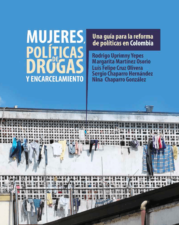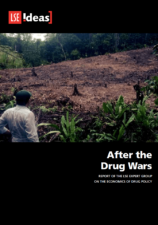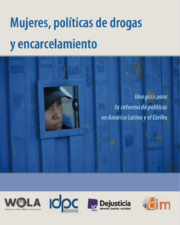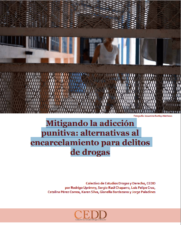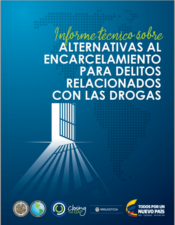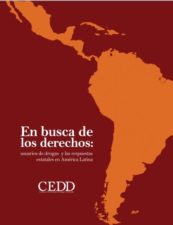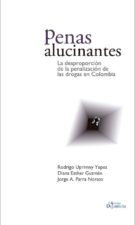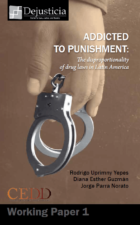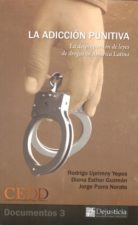Women, Drug Policy, and Imprisonment: A Guide for Reforming Policy in Colombia
By Luis Felipe Cruz, Margarita Martínez Osorio, Nina Chaparro González, Rodrigo Uprimny Yepes, Sergio Chaparro Hernández |
This guide diagnoses the impact of deprivation of liberty on women imprisoned due to drug offenses, and formulates recommendations to mitigate and prevent the disproportionate effects of incarceration.
After the Drug Wars
By Dejusticia |
The post-‘war on drugs’ era has begun. Prohibitionist policies must now take a back seat to the new, comprehensive, people-centred set of universal goals and targets that we know as the Sustainable Development Goals.
Women, Drug Policy, and Imprisonment
By Dejusticia |
This guide, written by the Washington Office on Latin America, the International Drug Policy Consortium, the Inter-American Commission of Women, and Dejusticia, proposes drug policy reform to reduce the female prison population in the Americas.
Mitigating Criminal Law Addiction: Alternatives to Prison for Drug-related Offenses
By Luis Felipe Cruz, Rodrigo Uprimny Yepes, Sergio Chaparro Hernández |
This report was prepared with the Colectivo de Estudios Drogas y Derecho and discusses alternatives to prison for drug-related offenses.
Technical Report for Alternatives to Imprisonment for Drug-Related Offenses
By Diana Esther Guzmán Rodríguez, Jorge Alberto Parra Norato, Rodrigo Uprimny Yepes, Sergio Chaparro Hernández |
In Search of Rights: Drug Users and Governments Response in Latin America
By Carolina Bernal Uribe, Diana Esther Guzmán Rodríguez, Jorge Alberto Parra Norato, Rodrigo Uprimny Yepes |
The Drugs and Rights Studies Collective published a new report that examines government responses to the consumption of illicit drugs in eight countries in Latin America: Mexico, Colombia, Peru, Ecuador, Brazil, Argentina, Uruguay and Bolivia.
Outrageous Penalties: Disproportionality in the penalization of drugs crimes in Colombia
By Diana Esther Guzmán Rodríguez, Jorge Alberto Parra Norato, Rodrigo Uprimny Yepes |
This study supports with solid empirical evidence that drug policies in Colombia that resort to the use of criminal law do not respect the principle of proportionality and therefore are not justifiable from the constitutional point of view.
Addicted to punishment: The disproportionality of drug laws in Latin America
By Dejusticia |
Addicted to Punishment: The disproportionality of drug laws in Latin America
By Diana Esther Guzmán Rodríguez, Jorge Alberto Parra Norato, Rodrigo Uprimny Yepes |
This document describes the disproportionality of the drug-related crimes in seven Latin American countries. Even though they are punishable behavior that does not directly or indirectly harm third parties, studies of drug crime related laws show a regional tendency to increase the use of criminal law
- « Previous
- 1
- 2
- 3
- Next »
